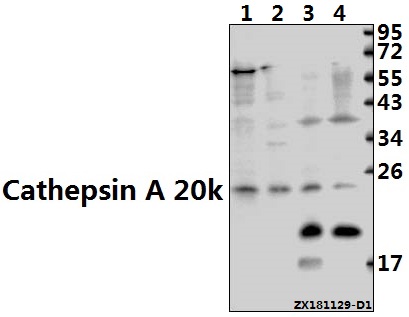Product Name :
Cathepsin A 20k (M327) polyclonal antibody Background :
The cathepsin family of proteolytic enzymes include several diverse classes of proteases. Cathepsins B, L, H, K, S and O comprise the cysteine protease class. Cathepsins D and E comprise the aspartyle protease class. The serine protease class includes cathepsin G. Cathepsins function in cellular metabolism and participate in peptide biosynthesis and protein degradation. Cathepsin A, a serine carboxypepidase, exists in a high molecular weight lysosomal complex with β-galactosidase (β-Gal) and α-neuraminidase (Neu1). Cathepsin A functions to protect β-Gal and Neu1 from intralysosomal proteolysis. Deficiencies in cathepsin A lead to deficiencies in β-Gal and Neu1. The gene encoding human cathepsin A maps to chromosome 20q13.12. Mutations in this gene cause glactosialidosis, a lysosomal storage disorder resulting from the β-Gal and Neu1 deficiencies. Product :
Rabbit IgG, 1mg/ml in PBS with 0.02% sodium azide, 50% glycerol, pH7.2 Storage&Stability :
Store at 4°C short term. Aliquot and store at -20°C long term. Avoid freeze-thaw cycles. Specificity :
Cathepsin A 20k (M327) polyclonal antibody detects endogenous levels of Cathepsin A 20k protein. Immunogen :
Synthetic peptide, corresponding to amino acids 327-380 of Human Cathepsin A. Conjugate :
Unconjugated Modification :
Unmodification
Cathepsin A 20k (M327) polyclonal antibody Background :
The cathepsin family of proteolytic enzymes include several diverse classes of proteases. Cathepsins B, L, H, K, S and O comprise the cysteine protease class. Cathepsins D and E comprise the aspartyle protease class. The serine protease class includes cathepsin G. Cathepsins function in cellular metabolism and participate in peptide biosynthesis and protein degradation. Cathepsin A, a serine carboxypepidase, exists in a high molecular weight lysosomal complex with β-galactosidase (β-Gal) and α-neuraminidase (Neu1). Cathepsin A functions to protect β-Gal and Neu1 from intralysosomal proteolysis. Deficiencies in cathepsin A lead to deficiencies in β-Gal and Neu1. The gene encoding human cathepsin A maps to chromosome 20q13.12. Mutations in this gene cause glactosialidosis, a lysosomal storage disorder resulting from the β-Gal and Neu1 deficiencies. Product :
Rabbit IgG, 1mg/ml in PBS with 0.02% sodium azide, 50% glycerol, pH7.2 Storage&Stability :
Store at 4°C short term. Aliquot and store at -20°C long term. Avoid freeze-thaw cycles. Specificity :
Cathepsin A 20k (M327) polyclonal antibody detects endogenous levels of Cathepsin A 20k protein. Immunogen :
Synthetic peptide, corresponding to amino acids 327-380 of Human Cathepsin A. Conjugate :
Unconjugated Modification :
Unmodification
-
 Western blot (WB) analysis of Cathepsin A 20k (M327) polyclonal antibody at 1:500 dilution Lane1:Panc1 whole cell lysate(40ug) Lane2:HEK293T whole cell lysate(40ug) Lane3:PC12 whole cell lysate(40ug) Lane4:Hela whole cell lysate(40ug)
Western blot (WB) analysis of Cathepsin A 20k (M327) polyclonal antibody at 1:500 dilution Lane1:Panc1 whole cell lysate(40ug) Lane2:HEK293T whole cell lysate(40ug) Lane3:PC12 whole cell lysate(40ug) Lane4:Hela whole cell lysate(40ug)
Bioworld Biotech only provide peptides for our antibodies and do not provide additional peptide customization services.
Price/Size :
USD 368/1mg/vial
Tips:
For phospho antibody, we provide phospho peptide(0.5mg) and non-phospho peptide(0.5mg).Describe :
Blocking peptides are peptides that bind specifically to the target antibody and block antibody binding. These peptide usually contains the epitope recognized by the antibody. Antibodies bound to the blocking peptide no longer bind to the epitope on the target protein. This mechanism is useful when non-specific binding is an issue, for example, in Western blotting (WB) and Immunohistochemistry (IHC). By comparing the staining from the blocked antibody versus the antibody alone, one can see which staining is specific; Specific binding will be absent from the western blot or IHC performed with the neutralized antibody.Formula:
Synthetic peptide was lyophilized with 100% acetonitrile and is supplied as a powder. Reconstitute with 0.1 ml DI water for a final concentration of 10 mg/ml.The purity is >90%,tested by HPLC and MS.
Storage:
The freeze-dried powder is more stable. For short time at 2-8°C. For long term storage store at -20°C.
Note :
This product is for research use only (RUO only). Not for use in diagnostic or therapeutic procedures.
 Cathepsin A 20k (M327) polyclonal antibody
Cathepsin A 20k (M327) polyclonal antibody  Datasheet
Datasheet COA
COA MSDS
MSDS SHIP
SHIP